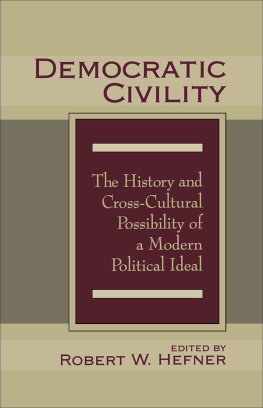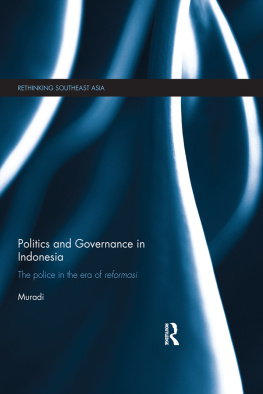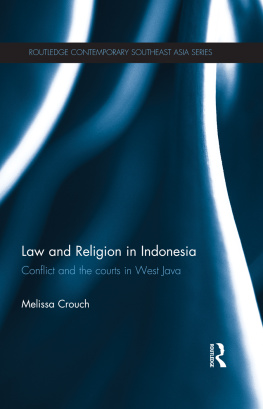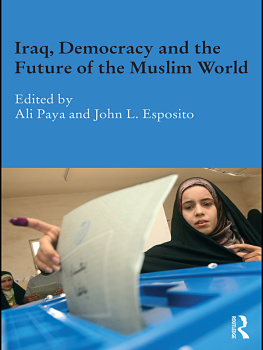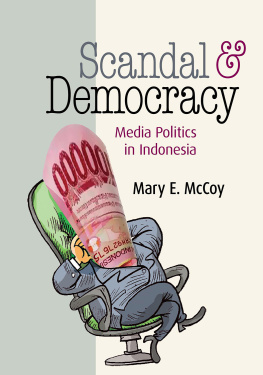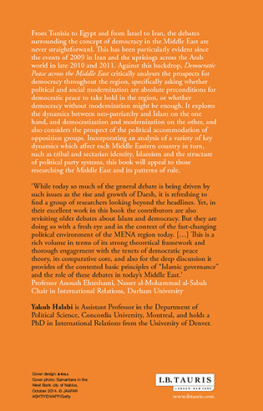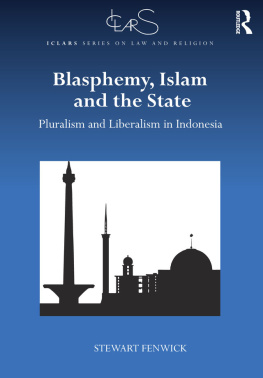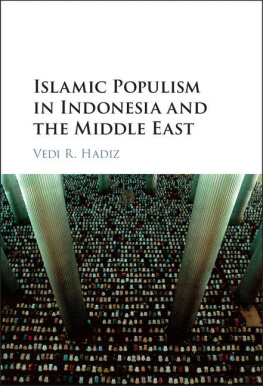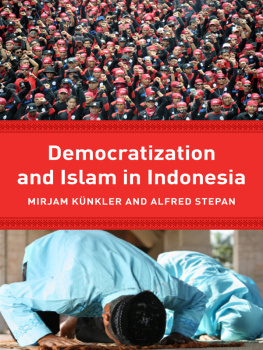Indonesian Pluralities
CONTENDING MODERNITIES
Series editors: Ebrahim Moosa, Atalia Omer, and Scott Appleby
As a collaboration between the Contending Modernities initiative and the University of Notre Dame Press, the Contending Modernities series seeks, through publications engaging multiple disciplines, to generate new knowledge and greater understanding of the ways in which religious traditions and secular actors encounter and engage each other in the modern world. Books in this series may include monographs, co-authored volumes, and tightly themed edited collections.
The series will include works that frame such encounters through the lens of modernity. The range of themes treated in the series might include war, peace, human rights, nationalism, refugees and migrants, development practice, pluralism, religious literacy, political theology, ethics, multi- and intercultural dynamics, sexual politics, gender justice, and postcolonial and decolonial studies.
Indonesian Pluralities
Islam, Citizenship, and Democracy
Edited by
ROBERT W. HEFNER
and
ZAINAL ABIDIN BAGIR
UNIVERSITY OF NOTRE DAME PRESS
NOTRE DAME, INDIANA
University of Notre Dame Press
Notre Dame, Indiana 46556
Copyright 2021 by the University of Notre Dame
All Rights Reserved
Published in the United States of America
Library of Congress Control Number: 2020947032
ISBN: 978-0-268-10861-8 (Hardback)
ISBN: 978-0-268-10862-5 (Paperback)
ISBN: 978-0-268-10864-9 (WebPDF)
ISBN: 978-0-268-10863-2 (Epub)
This e-Book was converted from the original source file by a third-party vendor. Readers who notice any formatting, textual, or readability issues are encouraged to contact the publisher at
CONTENTS
ACKNOWLEDGMENTS
The present book has a long but happy history. Its core aspiration originated in discussions that began a decade ago under the leadership of R. Scott Appleby, in the course of preparations for his multidimensional project Contending Modernities: Catholics, Muslims, and Secularists in the Late Modern World. In those years the project was organized out of the Kroc Institute for International Peace Studies at the University of Notre Dame. One of the editors of the present book, Bob Hefner, participated in some of the projects founding meetings and along the way met some of the scholars who went on to play leadership roles in the larger CM program: Ebrahim Moosa, Atalia Omer, and Munim Sirry among them.
Although Hefner had earlier been involved in one of the CM projects, Catholics, Muslims, and the New Plurality in Western Europe and North America, in 2014-15, Scott, Ebrahim, and Munim resolved to open another front in the CMs multiple projects, this one focused on aspects of religion and plurality in Indonesia and Africa. Scott subsequently invited the editors of the present book, Zainal Abidin Bagir and Bob Hefner, to submit a proposal for a project, which we did in 2015. The project was entitled Scaling-Up Pluralism: Local-National Collaborations for Civic Coexistence in Contemporary Indonesia. The book is the product of the collaborative research project carried out from late 2015 to late 2017.
Both of the editors for this book have benefited enormously from the generosity, collegiality, and intellectual counsel of Scott, Ebrahim, Munim, and Atalia. We cannot thank them sufficiently for their kindness and support, or for the intellectual vision they have shown in the Contending Modernities project as a whole. We also thank Dr. Toby A. Volkman, director of the Religion and World Affairs program at the Henry Luce Foundation, for her and the Foundations generous support of our research and the filmmaking sequel to the original field research. Six films based in part on some of the field sites described in this book are currently being produced and will be available for university and general distribution in late 2020.
Zainal Abidin Bagir and Bob Hefner visited all of the field sites several times over the course of the research and were the recipients of great kindness on the part of many local hosts. Although there are far too many individuals to mention in person, we want at the least to give special thanks to Margaretha Hendriks, Jacky Manuputty, Yance Rumahru, Hasbollah Toisuta, and Abidin Wakono. We also thank our American and Indonesian research partners in the project and the present book. All our colleagues in the research team took time away from their families and careers in Indonesia and the United States to cooperate in this multidisciplinary endeavor. We also thank our friends and colleagues at our respective institutes: Pak Zainal at the Center for Religious and Cross-Cultural Studies at the Graduate School of Gadjah Mada University and Bob Hefner at the Pardee School of Global Affairs at Boston University.
Last but not least, we dedicate the volume to the memory of the great Indonesian public intellectual Nurcholish Madjid (19392005), who in the 1990s was Bobs teacher and friend in things Indonesian. Cak Nur, as he was known, remains an intellectual and ethical exemplar for all who care about religion and pluralist recognition in the unfinished but great project that is the nation of Indonesia.
Bob Hefner and Zainal Abidin Bagir
ONE
The Politics and Ethics of
Social Recognition and Citizenship
in a Muslim-Majority Democracy
ROBERT W. HEFNER
The question of how to live together in a religiously plural society is much in the air these days, and for good reason. In Western democracies, the confluence of mass immigration, ISIS/Daesh terrorism, and alt-right populisms has shaken public confidence in once widely held assumptions as to civility and citizenship in a context of deep social difference (Mouffe 2005). Calls heard in the 1990s for some variety of multicultural citizenship have long since given way to demands for the exclusion of new immigrants and the coercive assimilation of those long arrived, not least if they happen to be Muslim (Joppke 2017; Modood 2007).
What is arguably a crisis of confidence in pluralist recognition and citizenship in the West is paralleled by an even greater sense of alarm in the Muslim-majority world, and nowhere more anxiously than in the Arab Middle East. By early 2013, the hopeful dreams of the 2011 Arab Spring had given way to the somber realization that in all but one of the Arab Muslim nations, Tunisia (Zeghal 2016), progress toward pluralist democracy had not merely stalled but ended. Political observers spoke with good reason of a crisis of citizenship in the Arab-Muslim world (Challand 2017; Meijer and Butenschn 2017). As if this inventory were not distressing enough, even in Southeast Asias once hopeful democracies, one hears today that, to borrow a phrase from the political scientist William Case (2011, 360), After a long run of global good fortune, democracy has fallen on hard times.
It is against this backdrop of democratic hope and challenge that Indonesia today takes on its public and policy importance. With its population of 266 million people, 87.2 percent of whom are Muslim, Indonesia is the largest Muslim-majority country in the world. It is also the third-largest democracy, having undertaken a return to electoral democracy in 199899 in the aftermath of thirty-two years of authoritarian rule. Some analysts, including the distinguished scholar of democratic transitions Alfred Stepan, have argued that Indonesia offers clear proof of the compatibility of Islam and pluralist democracy (Stepan 2014). But skeptics are not so sure. They argue that, however impressive Indonesias electoral achievements, the larger transition from the authoritarianism of the New Order regime (196698) to the democratic politics of the


